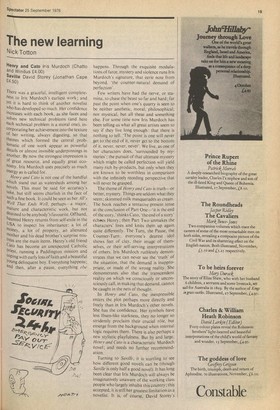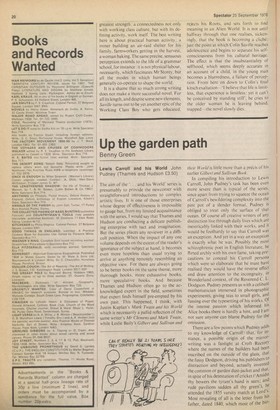The new learning
Nick Totton
Henry and Cato Iris Murdoch (Chatto and Windus £4.00)
Saville David Storey (Jonathan Cape £4.50)
There was a graceful, intelligent completeness to Iris Murdoch's earliest work; and Yet it is hard to think of another novelist Who has developed so much. Her confidence Increases with each book, as she faces and solves new technical problems (and here each technical problem is a moral one), incorporating her achievement into the texture of her writing, always digesting, so that themes which formed the central problematic of one work appear as powerful details or almost invisible underpinnings in another. By now the strongest impression is Of great resource, and equally great economy. Iris Murdoch uses precisely as much energy as is called for.
Henry and Cato is not one of the handful Which stand out as watersheds among her novels. This must be said for accuracy's sake, but still seems churlish in the face of such a fine book. It could be seen as her All's 14'ell That Ends Well, perhaps—a major, Mature and characteristic work, but not destined to be anybody's favourite. Offhand, haunted Henry returns from self-exile in the USA to inspect his inheritance: a lot of money, a lot of property, an alienated Mother and his dead brother's surprise mistress are the main items. Henry's old friend Cato has become an unexpected Catholic Driest, running a Paddington mission and Coping with early loss of faith and a beautiful Young delinquent boy. Everything happens; and then, after a pause, everything else
happens. Through the exquisite modulations of farce, mystery and violence runs Iris Murdoch's signature, that eerie note from beyond, 'the counter-natural demand of perfection'.
Few writers have had the nerve, or stamina, to chase the' beast so far and hard; far past the point when one's quarry is seen to be neither aesthetic, moral, philosophical, nor mystical, but all these and something else. For some time now Iris Murdoch has been telling us what all great artists seem to say if they live long enough : that there is nothing to tell. 'The point is one will never get to the end of it, never get to the bottom
of it, never, never, never'. We live, as one of her characters does, 'surrounded by my steries'; the pursuit of that ultimate mystery which might be called perfection will yield many rich by-products, but only when they are known to be worthless in comparison with the infinitely receding perspective that will never be grasped.
The theme of Henry and Cato is truth—or better, mystery. Things are seldom what they seem; skimmed milk masquerades as cream.
The book reaches a tentative present tense at the conclusion of Part One—it is the end of the story, thinks Cato, 'the end of a story' echoes Henry; then Part Two unmakes the characters' lives and knits them up again quite differently. The Turn, the Pause, the Counter-Turn: everyone's dearest idol shows feet of clay, their image of them selves, or their self-serving interpretations of others. Iris Murdoch ruthlessly demonstrates that we can never see the 'truth' of the situation, that the demand is inappro priate, or made of the wrong reality. She demonstrates also that the transcendent reality on which we consciously or unconsciously call, in making that demand, cannot be caught in the nets of thought.
In Henry and Cato, the inexpressible enters the plot perhaps more directly and freely than in Iris Murdoch's other novels.
She has the confidence. Her symbols have less Ibsen-like starkness, they no longer so stridently proclaim their crucial rOle, but emerge from the background when internal logic requires them. There is also perhaps a new stylistic playfulness. But by and large, Henry and Cato is a characteristic Murdoch novel; and needs no further recommendation.
Turning to Saville, it is startling to see how different good novels can be (though Saville is only half a good novel). It has long
been clear that Iris Murdoch will always be imaginatively unaware of the working class
people who largely inhabit this country ; this accepted, it is still her greatest limitation as a novelist. It is, of course, David Storey's greatest strength : a connectedness not only with working class culture, but with its defining activity, work itself. The best writing here is about practical human activity: a miner building an air-raid shelter for his family, farmworkers getting in the harvest, a woman baking. The same precise, sensuous perception extends to the life of a grammar school, for instance: it is not physical labour, necessarily, which fascinates Mr Storey, but all the modes in which human beings generally co-operate to shape the world.
It is a shame that so much strong writing does not make a more successful novel. For all its length, and despite some new elements, Saville turns out to be yet another epic of the Working Class Boy who gets educated.
rejects his Roots, and sets forth to find meaning in an Alien World. It is not until halfway through that one realises, sickeningly, that the book is becoming a cliche: just the point at which Colin Saville reaches adolescence and begins to separate his selfconsciousness from his cultural heritage. The effect is that the insubstantiality of selfhood, which seems deeply accurate in an account of a child, in the young man becomes a blurredness, a failure of perception. From here on down to Colin's final kitsch exaltation--`1 believe that life is limitless, that experience is limitless: yet it can't be conceived by standing still', he cries to the older woman he is leaving behind. trapped-the novel slowly dies.



































 Previous page
Previous page